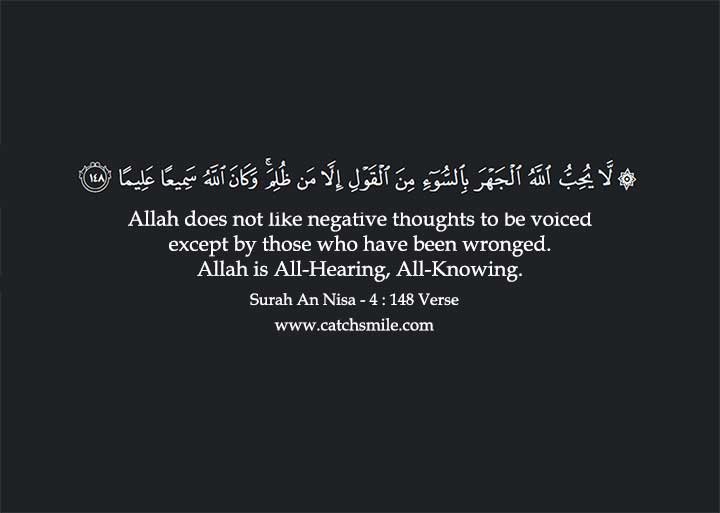۞ لَّا يُحِبُّ ٱللَّهُ ٱلْجَهْرَ بِٱلسُّوٓءِ مِنَ ٱلْقَوْلِ إِلَّا مَن ظُلِمَ ۚ وَكَانَ ٱللَّهُ سَمِيعًا عَلِيمًا
ALLAH does not like negative thoughts to be voiced—except by those who have been wronged.1 ALLAH is All-Hearing, All-Knowing.
Surah An Nisa – 4 : 148 Verse
Surah An-Nisa, Chapter 4, Verse 148 of the Quran. It states: “Allah does not like the public mention of evil except by one who has been wronged. And ever is Allah Hearing and Knowing.”
This verse highlights a general principle in Islam regarding the discussion and propagation of negative thoughts or evil matters. It emphasizes that Allah (God) does not approve of spreading negative or harmful speech, gossip, or slander unless it is done by someone who has been subjected to injustice or wrong.
In Islamic teachings, there is an emphasis on promoting peace, harmony, and positive speech. Muslims are encouraged to engage in good conduct, speak truthfully, and avoid causing harm to others through their words. This verse encourages individuals to refrain from engaging in negative speech, especially in public, as it can lead to division, conflict, and harm to society.
However, the verse acknowledges that there may be circumstances where it becomes necessary for a person who has been wronged to voice their grievances and seek justice. In such cases, where an individual has suffered injustice or oppression, they are allowed to express their negative thoughts and seek redress. Allah, being All-Hearing and All-Knowing, is aware of their situation and the validity of their concerns.
Overall, this verse highlights the importance of promoting positivity and refraining from spreading negativity, while also recognizing the need for addressing and rectifying injustices when they occur. It emphasizes the attributes of Allah as All-Hearing (Samī’) and All-Knowing (Al-‘Alīm), highlighting His awareness of all matters, including those that may have been suppressed or suffered in silence.


